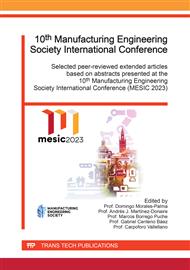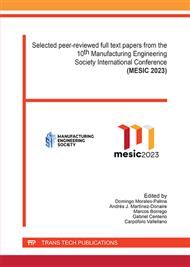[1]
C. Machado, J. P. Davim, (Eds.). Industry 4.0: Challenges, trends, and solutions in management and engineering. CRC press. (2020)
Google Scholar
[2]
X. Xu, Y. Lu, B. Vogel-Heuser,L. Wang. Industry 4.0 and Industry 5.0—Inception, conception and perception. Journal of Manufacturing Systems, 61, (2021) 530-535.
DOI: 10.1016/j.jmsy.2021.10.006
Google Scholar
[3]
E.Schaeffer. Industry X. 0: Realizing digital value in industrial sectors. Kogan Page Publishers.(2017)
Google Scholar
[4]
Davim, J. P. (Ed.). (2020). Manufacturing in Digital Industries: Prospects for Industry 4.0 (Vol. 6). Walter de Gruyter GmbH & Co KG.
Google Scholar
[5]
S. Chaudhuri, U. Dayal, V. Ganti. Data management technology for decision support systems. Adv. Comput., 62, (2004) 293-326.
DOI: 10.1016/s0065-2458(03)62007-3
Google Scholar
[6]
K. Wang, M. Franklin. Highly accurate data value prediction using hybrid predictors. In Proceedings of 30th Annual International Symposium on Microarchitecture (1997) (pp.281-290). IEEE.
DOI: 10.1109/micro.1997.645819
Google Scholar
[7]
C. P. Schmitt, M. Burchinal. Data management practices for collaborative research. Frontiers in Psychiatry, 2, (2011) 47.
Google Scholar
[8]
A. H. Tsang, W. K. Yeung, A. K. Jardine, B. P. Leung. Data management for CBM optimization. Journal of quality in maintenance engineering. (2006)
Google Scholar
[9]
A. Nourani, H. Ayatollahi, M. Solaymani-Dodaran. Data management system for diabetes clinical trials: a pre-post evaluation study. BMC Medical Informatics and Decision Making, 23(1), (2023) 1-10.
DOI: 10.1186/s12911-023-02110-w
Google Scholar
[10]
S. Sakr, A. Liu, D. M. Batista, M. Alomari. A survey of large scale data management approaches in cloud environments. IEEE communications surveys & tutorials, 13(3), (2011) 311-336.
DOI: 10.1109/surv.2011.032211.00087
Google Scholar
[11]
J. Lee, H. A. Kao, S. Yang. Service innovation and smart analytics for industry 4.0 and big data environment. Procedia cirp, 16,(2014) 3-8.
DOI: 10.1016/j.procir.2014.02.001
Google Scholar
[12]
P. Manco, M. Rinaldi, M. Caterino, M. Fera, R. Macchiaroli. Maintenance management for geographically distributed assets: a criticality-based approach. Reliability Engineering & System Safety, (2022) 218, 108148
DOI: 10.1016/j.ress.2021.108148
Google Scholar
[13]
D. B. Espíndola, L. Fumagalli, M. Garetti, C. E. Pereira S.S. Botelho, R. V. Henriques. A model-based approach for data integration to improve maintenance management by mixed reality. Computers in Industry, 64(4),(2013) 376-391.
DOI: 10.1016/j.compind.2013.01.002
Google Scholar
[14]
A. Razmi-Farooji, H. Kropsu-Vehkaperä, J. Härkönen, H. Haapasalo. Advantages and potential challenges of data management in e-maintenance. Journal of Quality in Maintenance Engineering, 25(3), (2019) 378-396.
DOI: 10.1108/jqme-03-2018-0018
Google Scholar
[15]
M. Caterino, M. Fera, R. Macchiaroli, D.T. Pham. Cloud remanufacturing: Remanufacturing enhanced through cloud technologies. Journal of Manufacturing Systems, 64, (2022) 133-148.
DOI: 10.1016/j.jmsy.2022.06.003
Google Scholar
[16]
M. Efthymiou, K. McCarthy, C. Markou, J. F. O'Connell. An exploratory research on blockchain in aviation: the case of maintenance, repair and overhaul (MRO) organizations. Sustainability, 14(5), (2022) 2643.
DOI: 10.3390/su14052643
Google Scholar
[17]
A.S. Rajasekaran, M. Azees, F. Al-Turjman. A comprehensive survey on blockchain technology. Sustainable Energy Technologies and Assessments, 52, (2022) 102039.
DOI: 10.1016/j.seta.2022.102039
Google Scholar
[18]
X. L. Liu, W. M. Wang, H. Guo, A.V. Barenji, Z. Li, G.Q. Huang. Industrial blockchain based framework for product lifecycle management in industry 4.0. Robotics and computer-integrated manufacturing, (2020) 63, 101897.
DOI: 10.1016/j.rcim.2019.101897
Google Scholar
[19]
S. Chen,X. Cai, X. Wang, A. Liu, Q. Lu, X. Xu, F.Tao. Blockchain applications in PLM towards smart manufacturing. The International Journal of Advanced Manufacturing Technology, (2022) 1-15.
DOI: 10.1007/s00170-021-07802-z
Google Scholar
[20]
Z. Li, Z. Tian, L. Wang, R. Y. Zhong X. Blockchain-enabled product lifecycle management. In Design and Operation of Production Networks for Mass Personalization in the Era of Cloud Technology (pp.349-379). Li, Z., Tian, Z., Wang, L., & Zhong, R. Y. (2022). Blockchain-enabled product lifecycle management. In Design and Operation of Production Networks for Mass Personalization in the Era of Cloud Technology (pp.349-379). (2022) Elsevier.
DOI: 10.1016/b978-0-12-823657-4.00013-0
Google Scholar
[21]
G. Zhao, S. Liu, C. Lopez,H. Lu, S. Elgueta, H. Chen, H., B.M. Boshkoska. Blockchain technology in agri-food value chain management: A synthesis of applications, challenges and future research directions. Computers in industry, (2019) 109, 83-99.
DOI: 10.1016/j.compind.2019.04.002
Google Scholar
[22]
V. J. Morkunas, J. Paschen, E. Boon. How blockchain technologies impact your business model. Business Horizons, 62(3), (2019) 295-306.
DOI: 10.1016/j.bushor.2019.01.009
Google Scholar
[23]
N. M. Kumar, P.K. Mallick . Blockchain technology for security issues and challenges in IoT. Procedia Computer Science, 132, (2018) 1815-1823.
DOI: 10.1016/j.procs.2018.05.140
Google Scholar
[24]
K. Nam, C.S. Dutt, P. Chathoth, M. S. Khan. Blockchain technology for smart city and smart tourism: latest trends and challenges. Asia Pacific Journal of Tourism Research, 26(4), (2021) 454-468.
DOI: 10.1080/10941665.2019.1585376
Google Scholar
[25]
M.A. Turino, M. Rinaldi, M.Fera, R. Macchiaroli. Information Distortion in a Fast Fashion Supply Network: The Impact of Digitalization. In Advances in Production Management Systems. Artificial Intelligence for Sustainable and Resilient Production Systems: IFIP WG 5.7 International Conference, APMS 2021, Nantes, France, September 5–9, 2021, Proceedings, Part II (pp.51-60). Cham: Springer International Publishing.
DOI: 10.1007/978-3-030-85902-2_6
Google Scholar
[26]
O. Ali, M. Ally, Y. Dwivedi. The state of play of blockchain technology in the financial services sector: A systematic literature review. International Journal of Information Management, 54, (2020) 102199.
DOI: 10.1016/j.ijinfomgt.2020.102199
Google Scholar
[27]
M. Rinaldi, M. A. Turino, M. Fera, R. Macchiaroli. Improving the distribution of covid-19 vaccines using the blockchain technology: the Italian case study. Procedia Computer Science, 217, (2023) 366-375.
DOI: 10.1016/j.procs.2022.12.232
Google Scholar
[28]
B. Müßigmann, H. von der Gracht, E. & Hartmann. Blockchain technology in logistics and supply chain management—A bibliometric literature review from 2016 to January 2020. IEEE Transactions on Engineering Management, 67(4), (2020) 988-1007.
DOI: 10.1109/tem.2020.2980733
Google Scholar
[29]
R. M. Garcia-Teruel. Legal challenges and opportunities of blockchain technology in the real estate sector. Journal of Property, Planning and Environmental Law, 12(2), (2020) 129-145.
DOI: 10.1108/jppel-07-2019-0039
Google Scholar
[30]
V. Wylde, N. Rawindaran, J. Lawrence, R. Balasubramanian, E. Prakash, A. Jayal, A., ... J. Platts. Cybersecurity, data privacy and blockchain: A review. SN Computer Science, 3(2), (2022) 127.
DOI: 10.1007/s42979-022-01020-4
Google Scholar



